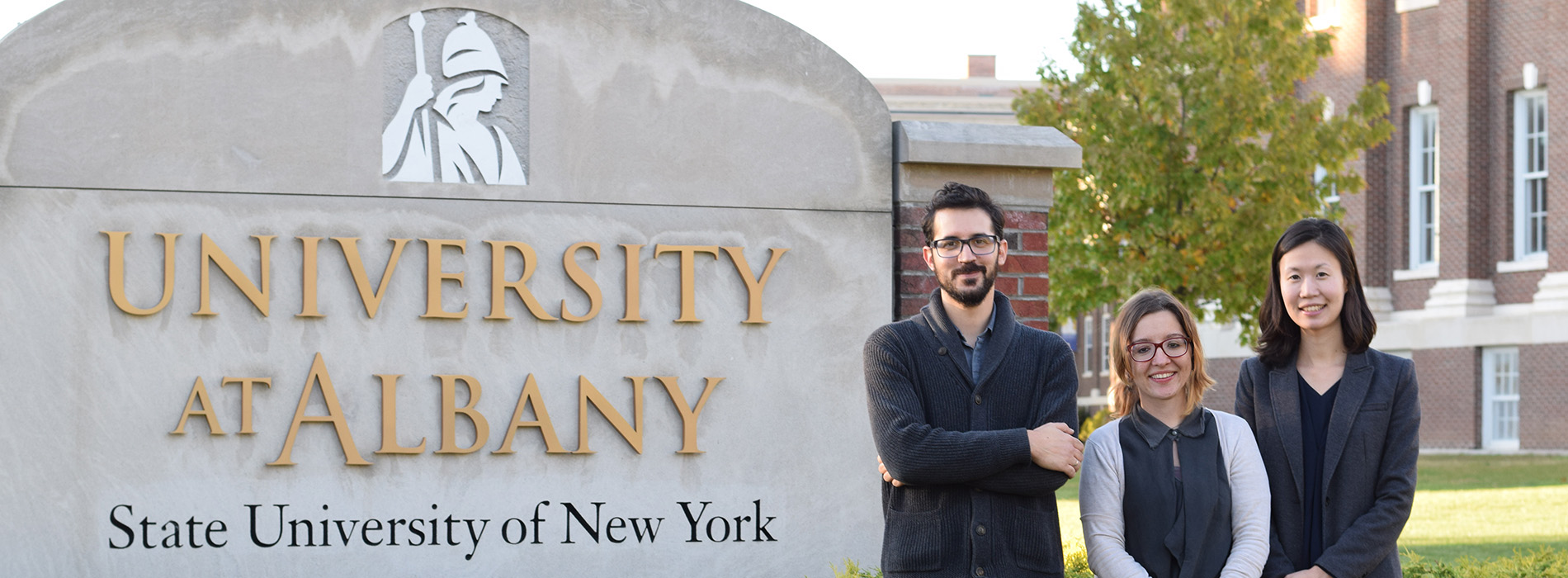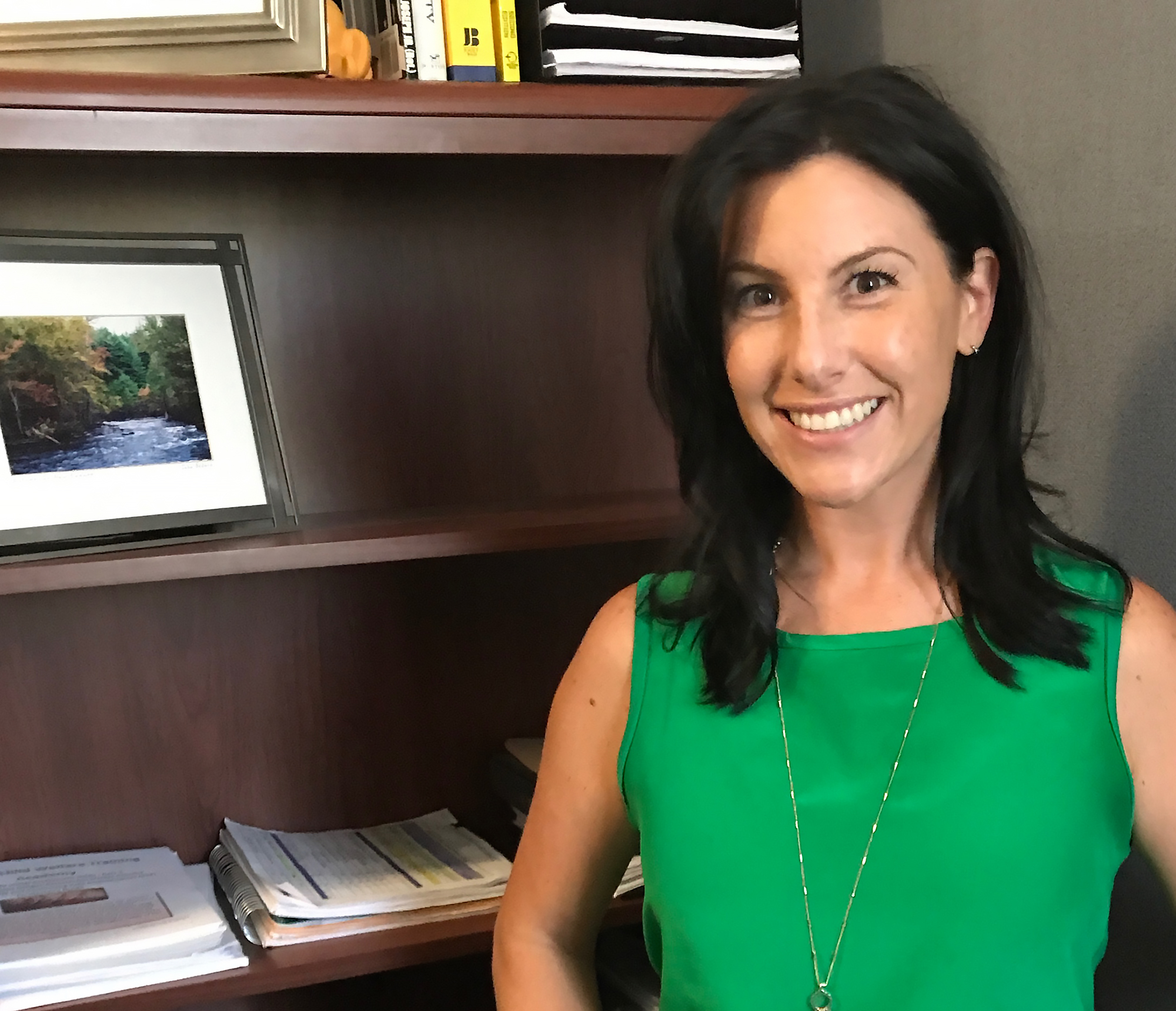

COMPASS
Community on Multimodality: Participatory Action, Service and Support
A team of researchers from the College of Engineering and Applied Sciences and the School of Social Welfare are developing the COMPASS app, designed to connect service providers with those in need.

One of the biggest challenges we face from the fallout of the coronavirus pandemic has been ensuring the wellbeing of the most vulnerable among us. Communities throughout the United States have struggled to find ways to assist those contending with poverty, hunger and homelessness.
For service providers, the challenges that preexisted COVID-19 have only become exacerbated, from technical limitations and policy regulations to privacy concerns and mistrust.
UAlbany researchers Daphney-Stavroula Zois, Charalampos Chelmis and Wonhyung Lee have spent the last three years developing solutions to these challenges.
Their project, “Community on Multimodality: Participatory Action, Service and Support (COMPASS)” aims to provide a seamless way to connect those in need with those who can help.
In 2017, the researchers received a $996,740 award from the Smart and Connected Communities Program of the National Science Foundation (NSF). Recently, the team was awarded an additional $331,320 from NSF, bringing the total amount to $1,328,060 for a duration of 5 years.
“Connecting those in need with those willing to help demands an integrated and automated systems approach to human services,” said Zois, who is an assistant professor of electrical and computer engineering at UAlbany.
To date, the project has focused on identifying the limitations and challenges faced by human service providers in their efforts to assist clients in meeting their basic human needs, determining key issues faced by the general public when searching for services, and developing novel decision-making mechanisms with the goal of maximizing the efficiency of human service delivery without compromising or weakening social connectivity.
“In the next phase, our goal is to unlock the next generation of human services, including mobile applications that can automatically construct and maintain a comprehensive list of providers within a given geographic area,” continued Zois, who leads the IMAgINE Lab at UAlbany’s College of Nanotechnology, Science, and Engineering (CNSE).

Doctoral student Kirsten DiNicola, a research assistant on the COMPASS Project, is currently in Las Vegas where she is working with Foster Kinship, a nonprofit organization dedicated to helping the 33,000 children in Nevada who live with relative caregivers, also known as kinship care. Funded through an NSF INTERN grant for $29,160, DiNicola is helping to assess the online suite of tools Foster Kinship utilizes to guide kinship caregivers to available community resources. This effort will help Foster Kinship and similar organizations to understand how their clients use communication technologies and what can be done to bridge any existing gaps.
"Unfortunately, there are far too many disparities in technology use and the most vulnerable among us suffer the greatest impact,” said DiNicola. “It’s critical for human service agencies to understand this as we expand the use of technology in our service delivery. In this way, we can design our tools to be effective for both providers and the people we serve."
DiNicola’s work will provide critical information for Zois and her colleagues as they aim to construct a unique dataset of individual-level service-seeking trajectories for computational social science research. The end goal will be to create algorithms for personalized and adaptive recommendations to address complex human needs over time.
Chelmis, an assistant professor of computer science at CEAS, and director of the IDIAS Lab, focuses on the ‘big data’ integration efforts within the project.
“With limited resources, human service providers need to make technology investments and understand that data, both qualitative and quantitative, are essential for them to better meet their clients’ needs,” Dr. Chelmis underscored.
In many cases, the providers may often be staffed by people not inclined to seek out data or who are wary of new technologies. “The fact that we still have those long-standing problems that human service providers are set up to address means there still is work to do, and big data can serve as a lever to creating change.”
Lee, an associate professor at UAlbany’s School of Social Welfare, is facilitating community engagement efforts to provide this service model to an expanding network of communities, including Las Vegas and Albany.
Creating a new model for the delivery of human and physical services is of course no easy undertaking. Community needs might include everything from looking for food and finding shelter, help with taxes, snow removal, noise complaints or potholes.
“Access to services usually requires extensive research and navigation,” said Lee. “Imagine looking for a service through online searches, calling someone and waiting on the line for hours, getting referred to different places, and still not having the need met.”

By working with organizations such as Foster Kinship, as well as The United Way of the Greater Capital Region, The Food Pantries of the Capital District, the Capital Region Refugee Roundtable, CARES of NY, and others, the researchers are collecting and analyzing data to help enact continuous improvement in service trajectories, capitalizing on their findings to develop a mobile app that can facilitate service navigation with a click of a button.
“This team – comprised of faculty from the College of Engineering and Applied Sciences and the School of Social Welfare – is a terrific example of how interdisciplinary expertise at UAlbany is making tangible improvements to community well-being,” said School of Social Welfare Dean Lynn Warner.
"This team brings an impressive set of skills to address a problem that has vexed nearly everyone at some point," said CEAS Dean Kim L. Boyer. "For the most vulnerable among us, the stakes can be very high. Like Dean Warner, I am extremely proud of this joint effort, yet another example of the CEAS mission to deliver Science in Service to Society."
COMPASS was also a recipient of the 2020 President’s Awards for Exemplary Public Engagement for its efforts to design practical solutions for deploying resources consistent with the priorities of communities. The overarching goal of the project is to eventually develop technology that can be adopted by organizations to be used in their day-to-day operation.
“We also strongly believe such technology has the potential to streamline the delivery of services during pandemics like COVID-19, since individuals who seek services can do so using our technological solution from the convenience of their home,” continued Lee.
Importantly, once completed, the project would also provide a detailed roadmap towards transferability of research outcomes to the rest of the world.
“We believe that the proposed technology has the potential to revolutionize the delivery of human services, lifting the burden of navigating services off of those most in need,” said Zois.
For more about this research or to contact the researchers, visit the IMAgINE Lab project description page.
Watch the YouTube video to learn more about the COMPASS Project: